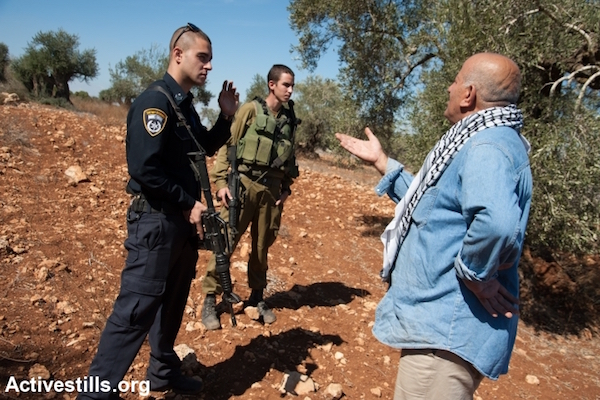An Israeli civilian admits to destroying a Palestinian’s fence, erected in order to prevent settlers from stealing wood for burning on the Jewish holiday of Lag Ba’Omer. The police close the case anyway.
By Yossi Gurvitz, for Yesh Din

On October 18, 2014, dozens of Israeli civilians coming from the direction of Hebron trespassed on land belonging to Muhammad Sadeq Muhammad Rashid Qanibi and began demolishing a fence he had built there. As in many other cases of assaults by Israeli civilians in the West Bank, the 18th was a Saturday, the Jewish Sabbath and day of rest. This day, as we have seen before, possesses near-mystical powers, as it often deters Israel’s security forces from arresting people. Or at least Jews, at any rate. The forces who arrived on the scene decided not to carry out any arrests, instead choosing to summon the suspects for interrogation the following day.
The police had a suspect, H.B., who actually confessed to the act: he told the policeman who arrived on the scene that he was responsible for the damage to Qanibi’s fence. According to H.B., Qanibi’s fence was blocking the Israelis’ route from Hebron to some local springs in the area.
The police began their investigation. They queried the Civil Administration over whether Qanibi was in fact authorized to build a fence on his land. A Civil Administration official responded in the affirmative. The investigative file given to Yesh Din by the police as part of our appeal is woefully incomplete, contrary to the regulations that require the police to provide us with all non-confidential material. The files do indicate that the Civil Administration official said that the fence was built with the permission of the Hebron Brigade Commander, as Israeli civilians had made it a habit to come to Qanibi’s land (where he grows olives), and take some wood for the Jewish holiday of Lag Ba’Omer, in which it is customary to build bonfires.
Qanibi gave his statement to the police along with CDs containing photos of the incident, which were taken by his neighbor. He noted that although Israelis regularly invade his land and steal his property, he was forced to pay for the fence himself.
The police summoned H.B. for interrogation under caution. Again, the information police provided about the interrogation is very fragmentary; aside from what he told the policeman during the incident itself – his confession about destroying the fence – he merely says something about “anarchists and extreme left organizations” being “regularly on the scene.” This may be seen as a justification or motive for the act he had already admitted to carrying out.
The police interrogated another central suspect, H.N., He denied any involvement in the destruction of the fence, but said it was constructed illegally and without permits; when the interrogator confronted him with the fact that the fence was actually built legally, H.N. replied: “This gives extra weight to what I have said, that sometimes more robust resistance than mere letter-writing is needed.”
Despite H.B.’s confession, the police closed the case. Why? It didn’t bother to tell us, even though it is obligated to provide this information to the representatives of a victim of a felony. We are trying to find out, and in the meantime Adv. Moria Shlomot of Yesh Din’s legal team appealed the closing of the case, citing the existence of a suspect who admitted to the crime.
Keep this in mind the next time the Israeli government tries to speak about the “rule of law” in the territories. This is what it looks like: a gang of hooligans raiding private property to steal lumber for a bonfire, an army that does not detain them because it’s Saturday, and a police force that closes the case — just because.
Two years after the incident, the fence around Qanibi’s land is still broken. He did not rebuild it, and why would he, considering goons can simply tear it down again — and even be caught red-handed — and get away scot-free. And there you have the essence of Israeli control of the West Bank.
Written by Yossi Gurvitz in his capacity as a blogger for Yesh Din, Volunteers for Human Rights. A version of this post was first published on Yesh Din’s blog.
